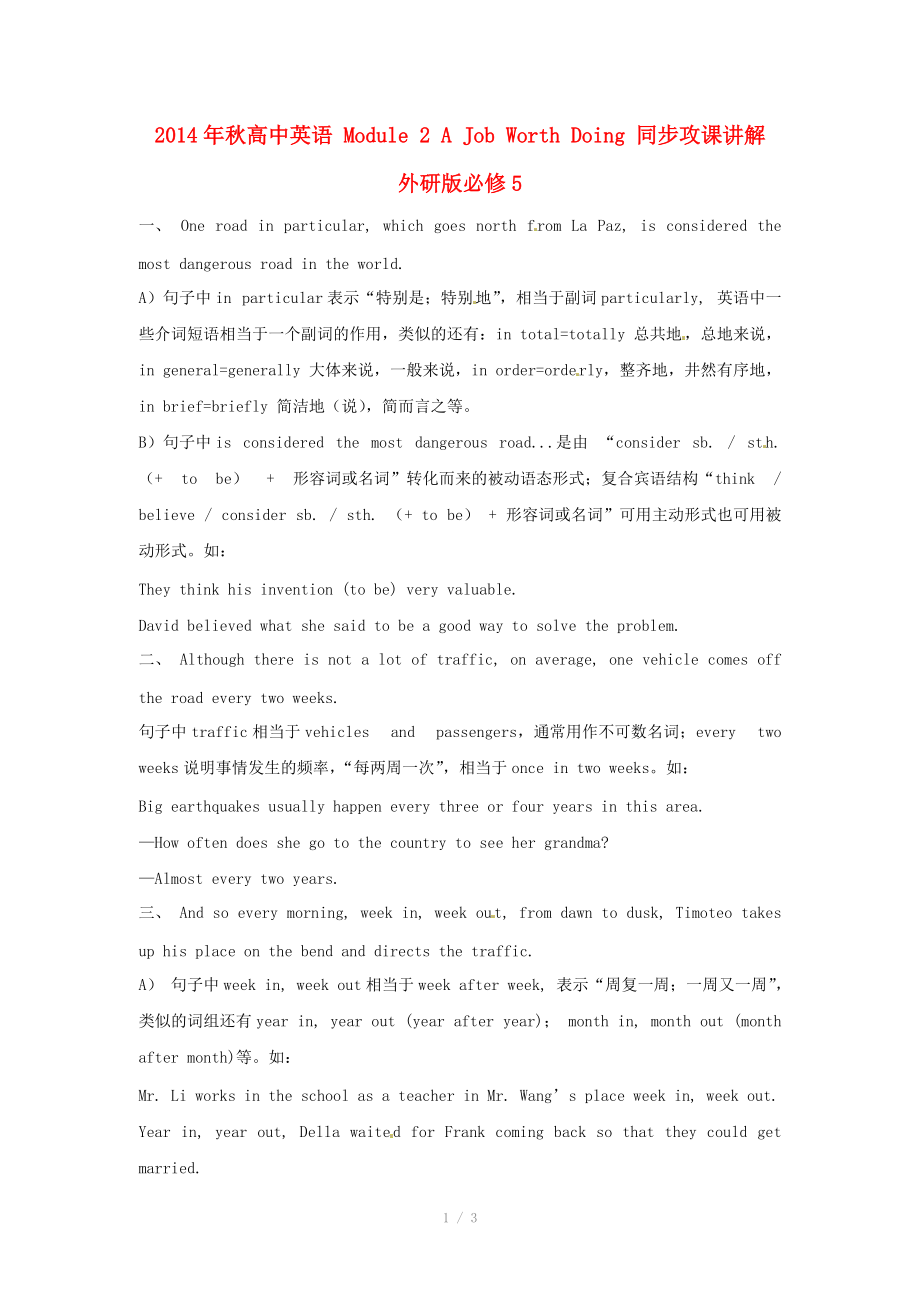《2014年秋高中英語 Module 2 A Job Worth Doing 同步攻課講解 外研版必修》由會(huì)員分享�����,可在線閱讀�����,更多相關(guān)《2014年秋高中英語 Module 2 A Job Worth Doing 同步攻課講解 外研版必修(3頁珍藏版)》請(qǐng)?jiān)谘b配圖網(wǎng)上搜索�����。
1�����、
2014年秋高中英語 Module 2 A Job Worth Doing 同步攻課講解 外研版必修5
一�����、 One road in particular, which goes north from La Paz, is considered the most dangerous road in the world.
A)句子中in particular表示“特別是�����;特別地”�����,相當(dāng)于副詞particularly, 英語中一些介詞短語相當(dāng)于一個(gè)副詞的作用�����,類似的還有:in total=totally 總共地�����,總地來說�����,in general=generally 大體來說,一般來說�����,in
2�����、 order=orderly�����,整齊地�����,井然有序地�����,in brief=briefly 簡(jiǎn)潔地(說)�����,簡(jiǎn)而言之等�����。
B)句子中is considered the most dangerous road...是由 “consider sb. / sth. (+ to be) + 形容詞或名詞”轉(zhuǎn)化而來的被動(dòng)語態(tài)形式�����;復(fù)合賓語結(jié)構(gòu)“think / believe / consider sb. / sth. (+ to be) + 形容詞或名詞”可用主動(dòng)形式也可用被動(dòng)形式�����。如:
They think his invention (to be) very valuable.
David belie
3�����、ved what she said to be a good way to solve the problem.
二�����、 Although there is not a lot of traffic, on average, one vehicle comes off the road every two weeks.
句子中traffic相當(dāng)于vehicles and passengers�����,通常用作不可數(shù)名詞�����;every two weeks說明事情發(fā)生的頻率,“每?jī)芍芤淮巍?����,相?dāng)于once in two weeks�����。如:
Big earthquakes usually happen ev
4�����、ery three or four years in this area.
—How often does she go to the country to see her grandma?
—Almost every two years.
三�����、 And so every morning, week in, week out, from dawn to dusk, Timoteo takes up his place on the bend and directs the traffic.
A) 句子中week in, week out相當(dāng)于week after week, 表示
5�����、“周復(fù)一周�����;一周又一周”�����,類似的詞組還有year in, year out (year after year)�����; month in, month out (month after month)等�����。如:
Mr. Li works in the school as a teacher in Mr. Wang’s place week in, week out.
Year in, year out, Della waited for Frank coming back so that they could get married.
B) 短語動(dòng)詞take up表示“占據(jù)(空間�����、地勢(shì)�����、比例等)”
6�����、�����。如:
The piano takes up half the room.
2 / 3
四、 What sort of jobs will people be doing ten years from now? According to a survey published by an American university, the ten fastest growing jobs will be related to computers and health.
A) will be doing... 所用的是將來進(jìn)行時(shí)態(tài)�����,將來進(jìn)行時(shí)態(tài)主要用于書面語或正式場(chǎng)合�����,一是強(qiáng)調(diào)將來某時(shí)
7�����、刻將要進(jìn)行的動(dòng)作�����,二是替代一般將來時(shí)態(tài)�����。如:
We will be waiting for you at the bus station at eight o’clock tomorrow morning. (將來進(jìn)行的動(dòng)作)
The whole competition will be going on next Thursday on the sports field. (代替一般將來時(shí)態(tài))
B) 詞組be related to... 表示“與……有關(guān)�����;與……有聯(lián)系”�����。如:
Their discussion is related to a bad pollution accident caused by the chemical works.
希望對(duì)大家有所幫助�����,多謝您的瀏覽�����!
 2014年秋高中英語 Module 2 A Job Worth Doing 同步攻課講解 外研版必修
2014年秋高中英語 Module 2 A Job Worth Doing 同步攻課講解 外研版必修

